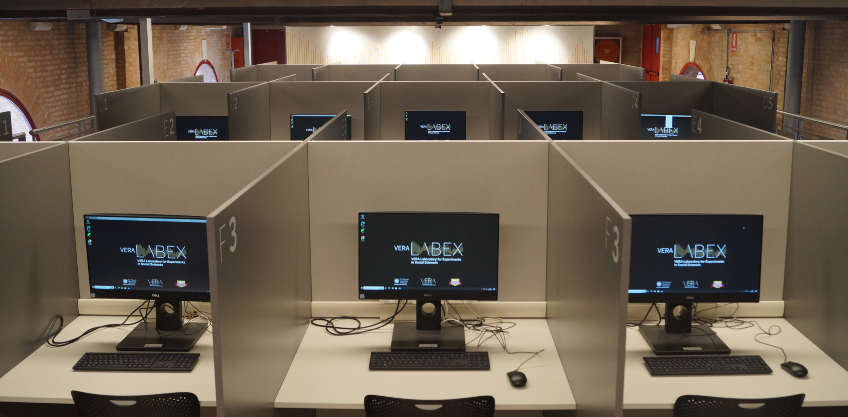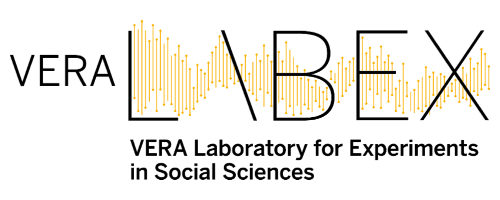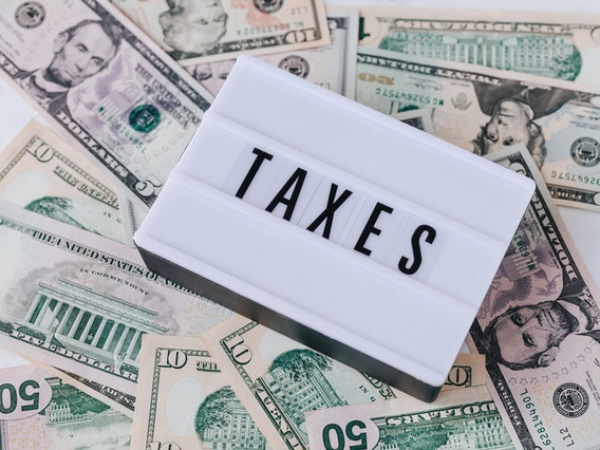VERALabEx
The VERA Laboratory for Experiments in Social Sciences (VERALabEx) is dedicated to research and teaching activities in experimental economics.
The laboratory consists of a room with 35 workstations and a control space and is located in San Giobbe on the first floor of Room 1A (Fondamenta San Giobbe, Cannaregio 873, 30121 Venice). The computers are placed in separate cubicles to avoid uncontrolled interactions between the participants during the experiment.


Participation in the experiments is completely voluntary, does not entail any risk and is remunerated. The experiments are run both online and at VERALabEx in San Giobbe Economics Campus. However, detailed information about the implementation of the experiment will be provided when inviting participants to an experimental session.
Note that your subscription to the computerized database does not entail any cost or obligation but it will allow you to receive the invitations to the experiments organized by our research team. When receiving the invitation to an experiment, you will be able to decide whether you are willing to participate in it.
The experiments are conducted by the research team of VERALabEx, and allow to develop various research programs in behavioral economics.
If you want to subscribe to the database of the potential participants in the experiments of the laboratory of experimental economics please click here.
Please note that you must be at least 18 years old in order to register to the database.
To get more information read the FAQS [ENG] [ITA] or write an e-mail to veralabex@unive.it.
Experimental Economics Publications in collaboration with VERA

Narratives on COVID-19 and Policy Opinions: A Survey Experiment
Armenak Antinyan, Wenlan School of Business, Zhongnan University of Economics and Law
Thomas Bassetti, Department of Economics and Management “Marco Fanno”, University of Padua
Luca Corazzini, Department of Economics and VERA, Ca’ Foscari University of Venice
Filippo Pavesi, School of Economics and Management, LIUC (Carlo Cattaneo University)
Working Papers 2021:04, Department of Economics, Ca’ Foscari University of Venice
Abstract
Narratives impact people’s opinions on relevant policy issues, and their political context may influence these effects. Indeed, some specific contexts may be more easily swayed by certain stories that provide explanations for current social and economic phenomena. We explore this issue by considering the ongoing COVID-19 pandemic as a natural experiment that creates the ideal conditions for existing narratives to gain momentum and spread. In particular, we run a survey experiment in the US by exposing subjects to two media-based popular explanations on the causes of the COVID-19 pandemic. The Lab narrative attributes the upstart of the pandemic to human error and scientific misconduct in a laboratory in China, while the Nature narrative describes the genetic and biological causes of the virus. We find evidence that subjects’ beliefs on the origins of the disease are influenced by the narrative they are presented with. Moreover, the Lab narrative leads subjects living in Republican-leaning states to express less favorable opinions about trade openness and the relevance of climate change relative to those living in Democratic-leaning states. Thus, our findings provide support for the idea that recalling stories that are part of larger narratives can lead to divergence of opinions on crucial issues leading to an increase in policy polarization. Finally, we explore the underlying features of social contexts associated with US states’ political orientation, that moderate the impact of narratives on policy opinions.

Cooperation and Transfer in similar one-shot repeated games: experimental evidence on the role of temptation and efficiency
Enrico Longo, Department of Economics, Ca’ Foscari University of Venice
Abstract
In this paper, we experimentally investigate the role of temptation and efficiency in shaping the ability of subjects to cooperate in two indefinitely repeated one-shot games with anonymous random matching, the Stag Hunt (SH) and the Prisoner's Dilemma (PD). Additionally, we test the existence and direction of behavioral spillovers between these two strategic games. Taking the results of Duffy and Fehr (2018) (D&F) as a baseline, we find that increasing efficiency leads to an increase in cooperation both in SH and PD. Similar to D&F, temptation positively affects cooperation in the SH while there are no significant effects in the PD. Behavioral spillovers between SH and PD are rather limited. We find positive behavioral spillovers from SH in the first stage of subsequent PD when temptation is low. However, the transfer is not persistent as subjects decrease cooperation in the subsequent rounds of the PD, but, in our experiment, where efficiency is high, this decreasing in cooperation is lighter than in D&F where efficiency is low; high efficiency with low temptation delays the return to defection.

On the relationship between information and social norms in affecting income tax evasion
Ludovica Spinola, Department of Economics, Ca’ Foscari University of Venice
Abstract
We run a laboratory experiment to study how information on enforcement results affects the overall level of individuals’ compliance. We expect that when the reported number of denounced tax evaders is perceived as high by citizens, on one hand, the latter infer that the empirical norm is to evade taxes and, consequently, comply less. On the other, citizens believe that the audit probability is high, hence they comply more. The final level of tax compliance depends on which of the two “forces” is stronger (H1). Conversely, when the number of convicted tax evaders is perceived as low by taxpayers, the overall level of tax evasion may be affected by the asymmetric effect of empirical information (H2). We run a tax evasion experiment with four informational treatments, in which participants are given enforcement results. In the “Info-Caught” baseline, individuals are informed on N, the number of subjects that have been denounced for tax evasion in a previous session. In the “Info-Evaders” treatment, subjects are given information on N and on E, the number of subjects who evaded taxes no matter whether they were audited or not, in a previous session. In the “Info-Prob” treatment, information on N and on the audit probability, p, are disclosed. In the “Full-Info” treatment citizens are informed on N, E and p. When N is perceived as relatively high (H1), we observe that information on N only significantly decrease the individual's propensity to evade. However, adding an information on p or on E seems to have no impact on individuals tax evasion behaviours. When N is perceived as relatively low (H2), the only information on N has no impact neither on the tax evasion. If, instead, we add to the information of N the one on p the decision to evade significantly increases, as the amount of taxes evaded. It seems that when N is perceived as low, the only information that have a significant effect and negative effect on tax compliance is that on p: individuals are uncertainty averse.

The Gates Effect in threshold public goods experiments: Donations flow to the causes preferred by the wealthy (and all donors can be better off because of it)
Luca Corazzini, Department of Economics and VERA, Ca’ Foscari University of Venice
Christopher Cotton, Department of Economics, University Of Queen's University
Enrico Longo, Department of Economics, Ca’ Foscari University of Venice
Tommaso Reggiani, Cardiff Business School, Cardiff University
Working Papers 2021:13, Faculty of Economics and Administration, Masaryk University
Abstract
This paper presents results from a laboratory experiment investigating the effects of endowment and preference heterogeneity on coordination, cooperation, and welfare in a setting with multiple threshold public goods. In treatments with homogeneous endowments, group members contribute the same amount and, regardless of their preferences over the public goods, no alternative stands out to be more salient. Instead, in treatments with heterogeneous endowments, the wealthiest agent makes substantially higher contributions, and her preferred public good becomes a viable coordination device for the rest of the group. In terms of welfare, financing the public good preferred by the wealthiest agent is not only beneficial for all group members but also reduces within-group inequality, thus making the most of the benefits from successful coordination concentrate on lower endowment classes. This paper presents results from a laboratory experiment aimed at investigating the effects of endowment and preference heterogeneity on coordination, cooperation, and welfare in a setting with multiple threshold public goods. In treatments with homogeneous endowments, group members contribute the same amount and, regardless of their preferences over the public goods, no alternative stands out to be more salient. Instead, in treatments with heterogeneous endowments, the wealthiest agent makes substantially higher contributions, and her preferred public good becomes a viable coordination device for the rest of the group. In terms of welfare, financing the public good preferred by the wealthiest agent is not only beneficial for all group members but also reduces within-group inequality, thus making the most of the benefits from successful coordination concentrate on lower endowment classes.

Are proactive narratives more convincing? An experiment
Luca Corazzini, Department of Economics, Ca’ Foscari University of Venice
Valeria Maggian, Department of Economics, Ca’ Foscari University of Venice
Marco Diamante, Department of Economics, Ca’ Foscari University of Venice
Abstract
This work aims at understanding whether narratives that attribute to subjects an active role in determining their future well-being are more popular. Based on the definition of narratives provided in Eliaz and Spiegler (2020), we designed a laboratory experiment where individuals are asked to play a simple zero-sum game against a robot having incomplete information about the rule determining the winner of the game. Strategies are bi-dimensional: they consist of colored symbols. For each participant, either the color or the symbol can determine the winner of the game, so guessing which of the two dimensions matters is fundamental. Notably, just one of the two dimensions will be controlled by subjects in the game, thus making one of the two rules more hopeful to believe in.
Before playing the game, in the instructions, subjects are shown some ambiguous evidence on the possible outcomes from the comparison of different colored symbols, not completely knowing the rule generating the payoffs. Evidence is shown in a narrative-compatible way: depending on the treatment, the order in which the subset of possible outcomes is shown puts more emphasis on one of the two rules and is thus our vehicle to induce a narrative, that is to say a model implicitly hypothesizing causal relationships between variables and outcomes. Shown evidence is ambiguous in the sense of being simultaneously compatible with the two alternative rules.
The aim of our experiment is to investigate the role of (proactive) narratives in affecting the behavior of subjects when facing a new phenomenon about which they don't know much. In the experiment we will be able to infer subjects' permeability to narratives both from their choices in the game and from eliciting their beliefs.
We hypothesize to find more permeability to the narrative appealing to the dimension controlled by the participant with respect to the one where the participants' action is not determinant in defining the likelihood of winning the game. On the same vein, we expect such a behavior to be more persistent after getting a confuting signal about which rule actually governs the game from round to round.
After the experiment we implement a questionnaire investigating subjects' ambiguity aversion (Cavatorta and Schröder, 2021) , risk aversion (Dohmen et al., 2011), cognitive reflection (Frederick, 2005 following Sirota and Juanchich, 2018), Optimism-Pessimism (SOP2, Kemper 2015).
